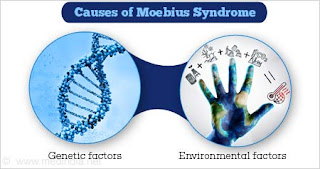What is Moebius Syndrome?
Moebius syndrome is a rare neurological disorder that affects the muscles used for facial expression, eye movement, and swallowing. People with Moebius syndrome are born with underdeveloped or absent sixth and seventh cranial nerves, which control the muscles of the face, eyelids, and tongue. As a result, they have difficulty making facial expressions and smiling, have limited eye movements, and may have difficulty with eating and speaking. Other symptoms can include difficulty breastfeeding, hand, and limb abnormalities, and hearing loss. The cause of Moebius syndrome is not well understood, and there is no cure for the condition. Treatment typically focuses on managing symptoms and improving quality of life through various therapies and surgical interventions.
Symptoms of Moebius
syndrome
Moebius syndrome is a neurological disorder that affects the muscles used for facial expression, eye movement, and swallowing. Some of the common symptoms of Moebius syndrome include:
Facial
paralysis: People with Moebius syndrome are unable to make
facial expressions, smile, or frown.
Limited
eye movement: They have limited or absent lateral eye movement, and
are unable to move their eyes from side to side.
Speech
difficulties: They may have difficulty speaking clearly and may
have a high-pitched voice.
![]() Eating
difficulties: They may have difficulty swallowing and may have to
be fed through a feeding tube.
Eating
difficulties: They may have difficulty swallowing and may have to
be fed through a feeding tube.
![]() Limb
abnormalities: They may have abnormally short arms, fingers, or
legs.
Limb
abnormalities: They may have abnormally short arms, fingers, or
legs.
Hearing
loss: Some individuals with Moebius syndrome may experience
hearing loss.
![]() Breathing
difficulties: They may have trouble breathing, especially when
sleeping, and may require a tracheostomy.
Breathing
difficulties: They may have trouble breathing, especially when
sleeping, and may require a tracheostomy.
It is important to note that the symptoms of Moebius
syndrome can vary greatly from person to person, and not everyone with Moebius
syndrome will experience all of these symptoms. Additionally, the severity of
symptoms can also vary.
Causes of Moebius
syndrome
 The exact cause of Moebius syndrome is not known, but
it is thought to be a combination of genetic and environmental factors. Some
possible causes of Moebius syndrome include:
The exact cause of Moebius syndrome is not known, but
it is thought to be a combination of genetic and environmental factors. Some
possible causes of Moebius syndrome include:
![]() Genetics: There
may be a genetic component to Moebius syndrome, as the condition has been
observed to run in families.
Genetics: There
may be a genetic component to Moebius syndrome, as the condition has been
observed to run in families.
![]()
Prenatal
exposure to toxins: Exposure to certain toxins, such as
alcohol, during pregnancy has been linked to an increased risk of Moebius
syndrome.
![]() Infections:
Certain infections during pregnancy, such as rubella,
have been linked to an increased risk of Moebius syndrome.
Infections:
Certain infections during pregnancy, such as rubella,
have been linked to an increased risk of Moebius syndrome.
![]() Drug
exposure: Exposure to certain drugs during pregnancy, such as
thalidomide, has been linked to an increased risk of Moebius syndrome.
Drug
exposure: Exposure to certain drugs during pregnancy, such as
thalidomide, has been linked to an increased risk of Moebius syndrome.
![]() Vascular
issues: Blood flow issues during embryonic development have
been implicated in the development of Moebius syndrome.
Vascular
issues: Blood flow issues during embryonic development have
been implicated in the development of Moebius syndrome.
It is important to note
that in many cases, the cause of Moebius syndrome is unknown. The condition is
considered to be a complex and multifactorial disorder, and a combination of
genetic and environmental factors likely play a role.
Treatment Options
for Moebius syndrome
There
is currently no cure for Moebius syndrome, and treatment is primarily focused
on managing symptoms and improving quality of life. Some of the treatments for
Moebius syndrome may include:
 Physical
therapy: Physical therapy can help improve the range of motion and
strength in the limbs, and can also help with speech and swallowing
difficulties.
Physical
therapy: Physical therapy can help improve the range of motion and
strength in the limbs, and can also help with speech and swallowing
difficulties. Occupational
therapy: Occupational therapy can help individuals with
Moebius syndrome develop skills needed for daily living, such as dressing,
eating, and writing.
Occupational
therapy: Occupational therapy can help individuals with
Moebius syndrome develop skills needed for daily living, such as dressing,
eating, and writing. Speech
therapy: Speech therapy can help individuals with Moebius
syndrome improve their speech and communication skills.
Speech
therapy: Speech therapy can help individuals with Moebius
syndrome improve their speech and communication skills. Placement
of feeding tubes: In some cases, individuals with Moebius syndrome may
require a feeding tube for nutrition.
Placement
of feeding tubes: In some cases, individuals with Moebius syndrome may
require a feeding tube for nutrition. Botulinum
toxin injections: Botulinum toxin injections, such as Botox, can be
used to temporarily paralyze certain muscles and reduce muscle spasms.
Botulinum
toxin injections: Botulinum toxin injections, such as Botox, can be
used to temporarily paralyze certain muscles and reduce muscle spasms. Reconstructive
surgery: Reconstructive surgery may be necessary to correct
deformities in the limbs or to improve breathing difficulties.
Reconstructive
surgery: Reconstructive surgery may be necessary to correct
deformities in the limbs or to improve breathing difficulties. Prosthetics: In
some cases, individuals with Moebius syndrome may benefit from the use of
prosthetics, such as leg braces or hand splints.
Prosthetics: In
some cases, individuals with Moebius syndrome may benefit from the use of
prosthetics, such as leg braces or hand splints.
Treatment for Moebius syndrome is often
interdisciplinary and may involve a team of healthcare professionals, including
physical therapists, occupational therapists, speech therapists, and
reconstructive surgeons. The goal of treatment is to help individuals with
Moebius syndrome lead as normal and fulfilling a life as possible.
Helping current and
future clinicians focus to learn to retain and thrive
Thank You



